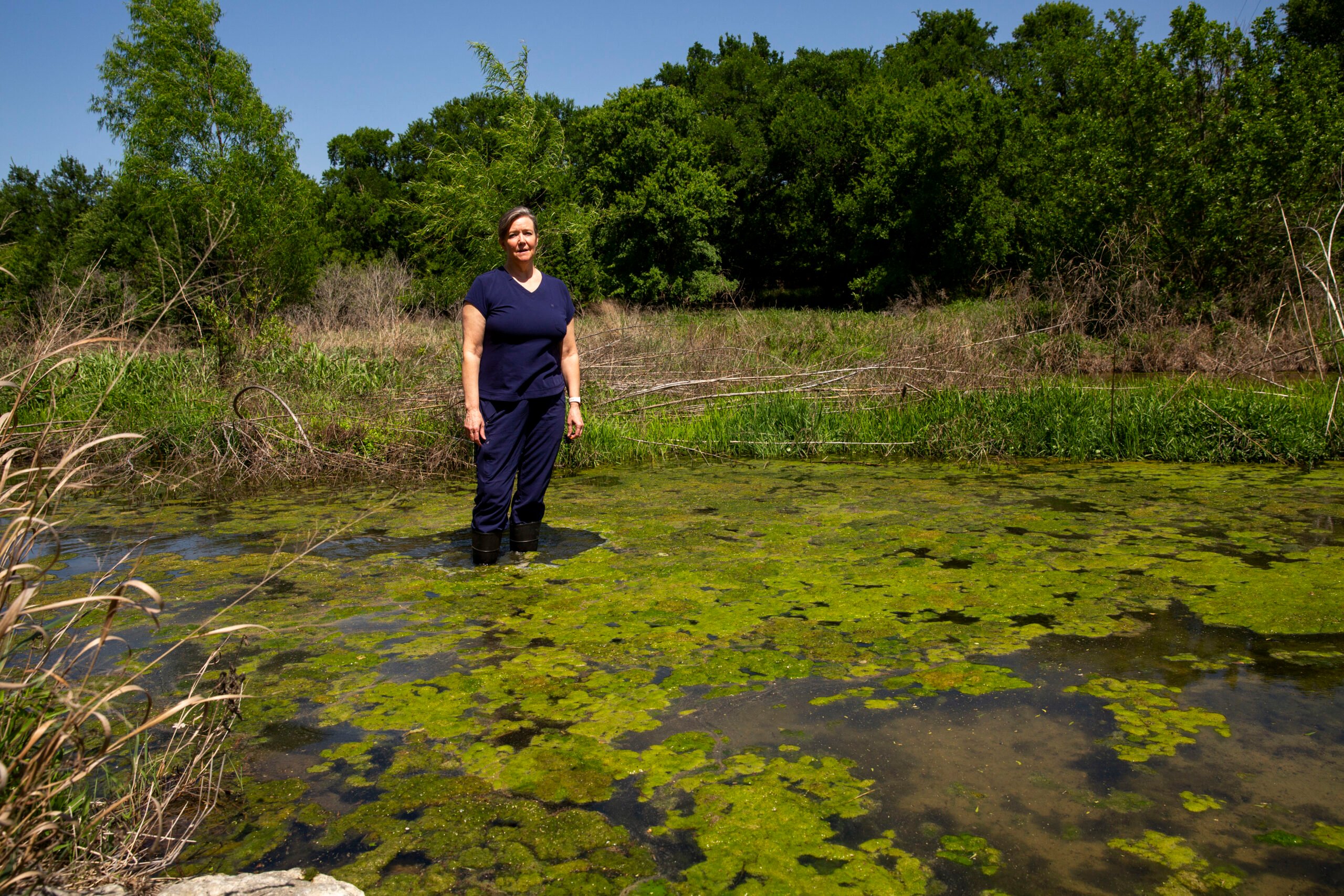News from the South - Texas News Feed
Texas postpartum Medicaid extension slow to rollout
Many new moms in Texas don’t know they qualify for a year of Medicaid, doctors say
“Many new moms in Texas don’t know they qualify for a year of Medicaid, doctors say” was first published by The Texas Tribune, a nonprofit, nonpartisan media organization that informs Texans — and engages with them — about public policy, politics, government and statewide issues.
Sign up for The Brief, The Texas Tribune’s daily newsletter that keeps readers up to speed on the most essential Texas news.
Almost all of the pregnant women Dr. Joshua Splinter sees at his rural East Texas practice are on Medicaid. For years, he would treat these patients during pregnancy, deliver their babies and then start the mad dash to squeeze in a follow-up visit before they lost insurance just eight weeks after giving birth.
This just didn’t work for him or his patients. He’d get someone on a treatment plan for a chronic condition, but then the hormone and weight changes after childbirth would require different interventions. He’d see early signs of postpartum depression or partner violence, and then lose contact with the patient once she lost insurance.
“These aren’t things where I start a medication and we’re done,” he said. “This requires close follow-up with continued treatment and non-medical intervention, and we can’t get that done in two months.”
So when the Texas Legislature voted to extend postpartum Medicaid to a full year in 2023, Splinter was ecstatic. This was going to be a “game changer” for his patients, he said.
But almost two years later, many of his patients and those like them across the state are still struggling to get the full range of health care they were promised. It took almost a year for the extended coverage to go into effect, leaving many of his patients in limbo, and even now, they’re still often falling through the cracks in Texas’ health care system.
The number of pregnant and postpartum Texans enrolled in Medicaid has almost doubled since before the pandemic, to more than 265,000. But many patients are unaware that they are still covered for an additional 10 months, according to a survey from Texans Care for Children, a health advocacy group. New moms report being unable to access the physical and mental health services covered by Medicaid, and doctors say changes are needed to ensure the workforce, reimbursement rates and coverage can keep up with a full year of need.
As the Legislature returns, Diana Forester, health policy director with Texans Care for Children, said there’s still much work to be done, such as increasing provider awareness and patient access, to ensure new moms are fully benefiting from this extended coverage.
“You can’t just turn on this extended coverage and expect that to be the end,” Forester said. “We as a state need to figure out what postpartum care looks like in Texas … Our leaders have an opportunity to make that work better for families, but it’s not there yet.”
How we got here
When Gov. Greg Abbott signed House Bill 12 into law in May 2023, Texas became the 41st state to extend postpartum Medicaid to 12 months. It was a victory years in the making, after several sessions of advocacy from health care providers, maternal health experts and moms themselves.
The state almost passed it in 2021, after the federal COVID relief package eased the way for states to get this extended coverage approved, but the Legislature instead passed a six-month extension that the federal government deemed “not approvable.”
But when the Legislature returned in 2023, Roe v. Wade had been overturned, abortion was virtually banned in Texas, and there was new momentum around bills to support pregnant women and families.
Sen. Lois Kolkhorst, a Republican from Brenham, carried the bill on the Senate side, and said at a hearing that extending coverage was about making sure “women who give birth to children in this pro-life environment are cared for … You cannot raise a child without being healthy.”
The bill passed with overwhelming bipartisan support, and Abbott signed it into law in May 2023. HHSC submitted the waiver request to the federal government, which approved it last January. The state began offering extended coverage March 1, 2024.
Awareness among doctors
After all that back and forth, half-steps and setbacks, many doctors were unaware that the extended coverage was actually in effect, Texans Care for Children found in its survey. Some doctors found out for the first time through their billing departments. Several said they wanted more outreach from the state health agency and the managed care organizations, like a flyer or training for doctors.
“The state could do a lot more in that area,” said Helen Kent Davis, a senior policy advisor to the Texas Academy of Family Physicians. “They’ve tried, to the extent that there’s funding for outreach, to get the word out, but there’s more to be done, for sure.”
In a statement, a spokesperson for Texas’ Health and Human Services Commission said they used a variety of approaches to inform the public about these changes, including calls and webinars, provider notices, posting information to their websites and working with managed care organizations to get the word out.
But knowledge gaps remain, Kent Davis said. As an example, she said pediatricians have not been educated on this change the way OB/GYNs and family physicians have. Since they’re seeing the baby regularly, these doctors could be a key ally in making sure the mom knows she still has coverage.
Doctors also report confusion about who is responsible for overseeing this year of health care. Texas Medicaid changed its policy to allow an OB/GYN to serve as a patient’s doctor for the whole year, but the survey found many doctors across specialties were not aware of that and, when asked, said they would prefer patients be handed off to a primary care provider.
“Patients have been seeing their obstetrician this whole time and the health care system is not good at handing them back to a primary care physician for the rest of that period,” Kent Davis said. “This is a significant culture shift for patients and providers.”
And with a shortage of primary care physicians, especially in rural areas, more coverage doesn’t automatically translate into more health care. One new mother in Mineral Wells told Texans Care for Children she would have to travel almost an hour to Fort Worth to see a primary care provider.
“Every day, I get really bad headaches… very bad headaches,” she said. “And it’s getting more consistent. I just deal with it.”
Awareness among patients
In a state where almost half of all pregnant women typically lost insurance two months after giving birth, convincing new moms that they can continue engaging with the health care system has been an uphill battle. Home-visiting nurses, community health workers and others who work closely with new moms report significant confusion and resistance from patients.
“They really had to talk their patients into accessing care, essentially, because they’re so used to not having coverage and so worried about the cost and having to absorb that personally,” Forester said.
It didn’t help matters that this extended coverage finally went into effect amid a historic fracture to the state’s Medicaid system. For three years during the pandemic, states kept everyone enrolled in Medicaid, but in spring 2023, were allowed to move people off their rolls.
Texas removed more people, including postpartum women, faster than any other state, against federal guidelines, The Texas Tribune and ProPublica found. The state required almost everyone to resubmit documents proving their eligibility, rather than relying on automatic approvals like other states. More than a million people lost coverage for bureaucratic reasons like failing to return a form. The state has acknowledged some errors, which they later fixed.
Amid this upheaval, Texas implemented the extended coverage, including reinstating women who lost Medicaid at two months but were still in their one-year postpartum period.
“It was really confusing for members who were like, ‘you terminated my Medicaid a month ago, I have the notice,’ and then they’re told that it’s being turned back on for a few more months,” Forester said. “And it’s really hard for a doctor to be able to educate their patients when it’s totally dependent on where they are in the postpartum period.”
Splinter said he’s had at least a dozen patients over the last year who had to call their managed care organization to get their coverage reinstated.
“I’m having to act a little like a social worker and educate the patient on who they need to call and what they need to say,” he said. As a family physician trained in high-risk pregnancies practicing in an underserved area, Splinter said, “there’s only so much of me to go around, especially if I have to spend more time on non-doctor work like this.”
A spokesperson for the state’s health agency said everyone who was enrolled in Medicaid or CHIP during their pregnancy were automatically reinstated for the remainder of their postpartum period. While some of this is naturally sorting itself out the longer the policy is in effect, Splinter said he was surprised at the work his patients had to do to get the coverage they qualified for.
“You’re leaving pregnant patients and new moms to fight up the chain and solve it themselves from the bottom” he said. “That just isn’t the right way to be doing this.”
More work to be done
As more new moms are able to take advantage of this extended coverage, doctors and advocates hope the health care system is able to meet their needs. In the short term, Splinter said, he’s hopeful that the state can proactively go back through its records and ensure women who qualify for this coverage are actually getting it.
In the long term, the state needs to address long-standing structural problems facing its health care system, like significant shortages in primary care and mental health providers. Advocates are pushing for increased reimbursement rates and reforms to the bureaucracy that providers must go through to accept Medicaid, to ensure doctors are willing to see these patients.
They also want Medicaid coverage to catch up to the extended time period women can receive these benefits.
For example, Texas Medicaid covers one postpartum depression screening, even though national groups recommend at least four, Kent Davis said. With an extra ten months of coverage, that’s a lot more touch points for doctors to be screening patients for mental health needs. She’d also like to see Medicaid cover lactation support among other needs that can emerge in the first 12 months postpartum.
“It takes a comprehensive strategy,” Kent Davis said. “Obviously the coverage issue was one part to address and, and we’re so happy that we were able to pass House Bill 12. But now that we have this coverage, what do we do to make sure women can get it?”
Disclosure: Texans Care for Children has been a financial supporter of The Texas Tribune, a nonprofit, nonpartisan news organization that is funded in part by donations from members, foundations and corporate sponsors. Financial supporters play no role in the Tribune’s journalism. Find a complete list of them here.
This article originally appeared in The Texas Tribune at https://www.texastribune.org/2025/01/30/texas-postpartum-medicaid-slow-rollout/.
The Texas Tribune is a member-supported, nonpartisan newsroom informing and engaging Texans on state politics and policy. Learn more at texastribune.org.
News from the South - Texas News Feed
Dish Soap: The Versatile Cleaning Hero You Didn’t Know You Needed
SUMMARY: Dish soap is a versatile cleaning tool that goes beyond washing dishes. It can remove hair dye from skin, clean makeup brushes, reduce condensation on windows, stop squeaky doors, and even clear clogged drains. Dish soap works as a gentle insecticide for plants and is effective for cleaning various surfaces. Consumer Reports highlighted top picks, with Dawn Ultra praised for its suds and Gain Ultra Clean for affordability. However, dish soap shouldn’t be used in dishwashers or washing machines as it creates excess suds that can damage appliances. Additionally, excessive use on skin or hair can strip natural oils.

Discover the incredible versatility of dish soap, a kitchen staple that does more than just cut through grease. Consumer Reports unveils how this soapy superhero can tackle a variety of messes around your home, making it the secret weapon hiding in plain sight.
News from the South - Texas News Feed
Mostly cloudy, slight chance of storms west of SA tonight
SUMMARY:
Title: Mostly cloudy, slight chance of storms west of SA tonight.
Summary: Good Monday morning! I’m meteorologist Justin Horn sharing the forecast. Today will be mostly cloudy with temperatures near 90. Although there’s a slight chance of showers tonight due to potential storms from Mexico, it’s unlikely to impact the river parade. Tomorrow should remain quiet, but expect increased rain chances midweek, particularly Wednesday evening with possible strong thunderstorms. A 40% chance of rain is forecast for Wednesday, along with similar chances on Thursday and Friday. Stay weather-aware, especially with ongoing Fiesta events, but no need to cancel plans.

Better chances of rain by midweek.
News from the South - Texas News Feed
In Booming Central Texas, Wastewater Is Polluting Rivers and Streams
Editor’s Note: This article originally appeared at Inside Climate News, a nonprofit, independent news organization that covers climate, energy, and the environment. It is republished with permission. Sign up for their newsletter here.
Margo Denke set out to rally the town when she learned that a Christian youth camp planned to build a wastewater treatment plant and discharge its effluent into the pristine Hill Country creek that ran through her small ranch.
Denke, a 1981 graduate of Harvard Medical School who moved to the Hill Country in 2013, printed fliers, put them in Ziploc bags and tied them to her neighbors’ cattle gates in the tiny community of Tarpley, population 38. A coalition of families pooled resources, hired a lawyer and dug in for a yearslong battle.
Theirs was one of many similar struggles that have unfolded in recent years across Central Texas, where protection of creeks and rivers from treated wastewater discharge often falls to shoestring community groups as an onslaught of population growth and development pushes ever deeper into the countryside.
“All this would have been destroyed,” Denke said in April as she surveyed a spring-fed stretch of Commissioners Creek. “Raising the money to fight this is not easy. But you have to, you can’t let this just slide by.”
Eventually, the camp owner, who did not respond to a request for comment from Inside Climate News, agreed in settlement negotiations not to discharge into the creek. Instead, they would spray their treated effluent over their own property—an increasingly popular means of wastewater disposal. In exchange, the neighbors would drop their opposition to the two-story dam the camp erected for a private lake and waterpark on little Commissioners Creek.
“I’m trying to stay positive about it,” Denke said. “It was a huge win.”
But the battle never ends amid the rapid pace of development in Texas. Several miles downstream, another subdivision developer wants to treat wastewater and discharge it into Hondo Creek. And in a neighboring watershed, another community group recently stopped another Christian youth camp from discharging into the Sabinal River.
Similar stories repeat throughout Central Texas, where two decades of booming population growth have come with a massive increase in domestic wastewater—mostly human sewage. The effluent from wastewater treatment plants appears clean and clear, but it contains high levels of organic nutrients that can cause algae blooms and devastate native aquatic ecosystems when dumped into streams and rivers.

“Unfortunately, society at large has no idea,” said Jeff Back, a staff scientist at Baylor University who has studied nutrient pollution in Texas waterways for 20 years. “Developers want to continue to do their business, but they need to be responsible.”
Now, as the state Legislature meets for its biennial session, advocates for water protection are supporting a bill that would prohibit most new discharges of treated wastewater into the state’s last 21 stretches of pristine rivers and streams, as defined by measured nutrient levels. Filed by state Sen. Sarah Eckhardt, a Democrat from Austin, it’s the latest iteration of a bill that groups have tried repeatedly without success to pass in Texas.
It wouldn’t ban development along pristine streams. It would just require other outlets for treated wastewater beside the natural waterways. Plenty of solutions are available on the market, from systems for onsite re-use to treatment methods that remove the nutrients from wastewater.
“People have to understand that it’s not going to be free,” Back said. “People want to do everything as cheaply as possible.”
The luxury of doing things cheaply might not last forever. As Texas cities begin to outgrow their water supplies and state leaders increasingly recognize shortages looming on the horizon, there may come an end to the days of showering lawns with drinking water while dumping treated effluent into rivers for disposal.
“This effluent should be considered a resource, not a nuisance to get rid of,” said David Venhuizen, a civil engineer in Austin who sells hardware for on-site water reuse.
It could be used to irrigate and fertilize the turf grass of parks, sportsfields, golf courses and private lawns, which make up the bulk of municipal summertime water use in Texas. In existing cities, such reuse has proven prohibitively expensive because plumbing from wastewater treatment plants is expensive to run out to individual customers.
New development, however, could be built to incorporate on-site wastewater reuse, said Venhuizen. His system, buried underground like a septic system, can treat a household’s wastewater, then drip it beneath the lawn. It could also be adapted at neighborhood scale for subdivisions to create a decentralized network of wastewater treatment and local redistribution.
But the breathless pace of suburban sprawl in Texas leaves no time to pause and make systemic changes. Instead, Texas cities run pipelines to distant aquifers to meet the ever-growing needs of new neighborhoods that will use most of their drinking water on lawns while piping away their effluent for treatment and discharge into a creek.
“We’re going to continue to rely on extraction instead of any regenerative kind of water systems,” said Venhuizen, 78, on a rocking chair in his backyard fitted with rainwater collection tanks and covered in native plants. “The madness has to stop.”
Stephanie Morris bought a house on the South Fork San Gabriel River, 27 miles north of Austin, in 2013. She wouldn’t have done it if she knew what the beautiful river would become.
When she and her family moved in, Morris said, the neighbors were already exhausted by a long-running battle with the neighboring city of Liberty Hill over its discharge of treated wastewater into the river about a quarter mile upstream.
Back then, Liberty Hill had about 1,000 residents, and its discharge created relatively minor algae problems in the river. Then its population exploded, like many other small cities of Central Texas. Now almost 15,000 people live in Liberty Hill, most of them relying on the South Fork San Gabriel for their wastewater disposal needs.
“There’s a hell of a lot more people pissing in the pond,” said Morris, a high-risk labor and delivery nurse, as she trudged through the green, mucky river in high rubber boots. “Every year things would get worse as their volume increased.”
All those nutrients, primarily from human waste, have caused the riverbed to choke up entirely with algae at times, extending three to five miles downstream and burying native ecosystems. When the algae dies, it sinks and rots in heaps of black, stinking muck.
Year by year, Morris became increasingly involved, until she spent all of her free time trekking the riverbed and taking photos of the destruction to show to her elected representatives, commissioners of the TCEQ and judges at the administrative law courts in Austin.
As a result, the TCEQ has twice reduced the concentrations of phosphorus that the Liberty Hill plant is permitted to discharge, although its overall volume continues to increase. The river looks better today than it did several years ago, Morris said. But the fight has nearly exhausted her.
“This has cost so much time and money, it’s not even funny,” she said. “Private citizens should not have to be enforcing the environmental standards of the state.”
The story of the South Fork San Gabriel, and the pictures that circulated online, jolted other communities to fight against proposed discharges in their areas, said Annalisa Peace, executive director of the Greater Edwards Aquifer Alliance, a group that helps its member organizations challenge the proposed discharge permits in the 21 counties that overlie the Edwards and Trinity aquifers.
“It’s incumbent upon the citizens and GEAA to raise the money for the legal fees to do all this,” Peace said. “It seems to be that the burden is placed on the average citizen.”
Most new wastewater sources come from new housing subdivisions and the municipal utility districts that are established to serve them, she said. Others are commercial projects, from summer camps to music venues, that plan to treat their own wastewater. Much of the new construction, especially near pristine streams, takes place outside of any city’s jurisdiction so it faces little regulation or oversight.
Previous attempts to pass statewide regulations of discharges into waterways have repeatedly failed, said Peace, who has worked with GEAA for 20 years. Much of the resistance comes from lobbying by major homebuilding companies that are making big money off explosive population growth in Texas.
“It’s the big nationals that we’re really seeing the most intransigence and the most organized opposition from,” she said. “They don’t like regulation.”
The Texas Association of Builders declined to comment on this report.
Peace wishes for a law increasing treatment standards for wastewater discharge into all Texas waterways. But she’ll settle for the current bill, which protects just the remaining pristine segments, and provides exemptions for cities and river authorities.
Outside the Texas Legislature, groups have had more success challenging individual permits. Such was the case on the Upper Sabinal River, where another Christian youth camp, operated by the national nonprofit Young Life, proposed in 2019 to build a wastewater treatment plant that would discharge into the river. Local landowners rallied. They gathered 25,000 signatures on a petition and hired a lawyer to challenge the discharge permits.
Faced with an extensive delay in state administrative courts, Young Life opted to settle instead. Young Life did not respond to a request for comment.
“Once this became a high-profile issue, they were willing to look at alternatives,” said Jeff Braun, a landowner on the upper Sabinal River and a spokesperson for the Bandera Canyonlands Alliance, which fought the permit. “I think it hit a chord with a lot of people that are native Texans because they all love these iconic streams.”
In an announcement of the settlement agreement in August 2021, Young Life said it would reuse most of its wastewater on-site for irrigation rather than discharging into the river. Regulators call this practice “land application,” and it’s growing in popularity.
By banning discharges into pristine streams, the bill in the Legislature would effectively force developers in those areas to use land application for wastewater disposal. Although the practice is less impactful to waterways than direct discharge, it can still do damage.
Mike Clifford, technical director at the Greater Edwards Aquifer Alliance, said that opposition from community groups has already pushed many developers to seek land application permits.
“The problem now is we just have too many of these,” he said. “They’re popping up everywhere.”
The TCEQ has issued 413 active permits for land application of treated wastewater, according to online records, and 2,374 active permits for discharge.
For example, community groups are currently fighting a planned 10,000-seat amphitheater, luxury hotel and condominium complex on 84 acres nestled next to the Barton Creek Habitat Preserve on Barton Creek, a pristine stream, in Austin. The complex would treat its own wastewater with land application permits to spray up to 120,000 gallons per day of treated effluent onto its property.
Over time, Clifford said, the nutrient pollutants would accumulate until a big rainstorm washes them into Barton Creek. About five miles upstream, on Fitzhugh Road, another proposed 5,000-person music venue wants to treat its own wastewater and discharge it into ponds near Barton Creek.
One solution, Clifford said, would be for Texas to require developers to add nutrient removal to their treatment process.
“It’s just about money,” he said. Nutrient removal “can double the cost of a wastewater treatment plant.”
With adequate investment, plenty of solutions exist. Some could even be configured to make money that covers part of their costs. For example, some treatment systems that remove nitrogen and phosphorus from water do it by growing algae, which could be harvested and sold as fertilizer. To avoid the buildup of nutrients where effluent is sprayed onto land, grasses can be harvested and sold as hay. Irrigation of hay for livestock is the largest water demand driving shortages in parts of Texas and the West.
Eventually, water scarcity will compel urban planners to make use of wastewater rather than dumping into rivers, said Brian Zabcik, advocacy director for the Save Barton Creek Association, which has pushed for discharge protections on Texas pristine streams through several successive legislative sessions.
“It’s crazy that we’re using our highest-quality drinking water to water our lawns and flush our toilets,” he said. “It makes a lot more sense to use recycled wastewater for those purposes.”
Texas might soon have to consider systemic changes as its population continues to boom, temperatures continue to rise, a multi-year drought persists and water shortages approach. Already, changes are beginning in small pockets.
Zabcik pointed to West Texas cities of Big Spring and El Paso, national pioneers in the reuse of treated effluent for drinking water. In Austin, a new city government building features on-site wastewater treatment and recycling for non-potable uses. Consumer products exist to do the same at any home, building or neighborhood.
These aren’t radical practices, said Zabcik, who lives on his grandparents’ ranch in Bell County. Conserving water was part of life for previous generations in Texas. For example, Zabcik said, his grandparents grew a garden, but not with their drinking water; they ran in a pipe from their stock tank. The water from their washing machine drained onto the lawn.
Passing protections on pristine streams won’t ban development along those stretches, Zabcik said. It will just require new approaches to wastewater use. Although they remain costly for now, prices may come down as necessity boosts demand for new affordable products.
The timeline will depend on whether Texas finds the political will to implement new wastewater systems in advance, or if it waits for scarcity conditions to force its hand.
“We’ve got to reuse every drop,” Zabcik said. “It’s really stupid to be wasting wastewater.”
The post In Booming Central Texas, Wastewater Is Polluting Rivers and Streams appeared first on www.texasobserver.org
Note: The following A.I. based commentary is not part of the original article, reproduced above, but is offered in the hopes that it will promote greater media literacy and critical thinking, by making any potential bias more visible to the reader –Staff Editor.
Political Bias Rating: Center-Left
The content reflects a strong focus on environmental conservation, community activism, and the impact of development on natural resources. It presents the struggles of local communities in Central Texas against wastewater discharge into pristine rivers, framing these efforts as necessary for protecting the environment. The mention of political figures such as Democrat Sarah Eckhardt and advocacy for regulatory changes indicates a tendency toward policies aimed at environmental protection, often associated with more progressive or center-left positions. The article also critiques the role of developers and industry in resisting regulation, which aligns with a broader environmentalist agenda.
-

 SuperTalk FM6 days ago
SuperTalk FM6 days agoNew Amazon dock operations facility to bring 1,000 jobs to Marshall County
-

 News from the South - Missouri News Feed2 days ago
News from the South - Missouri News Feed2 days agoMissouri lawmakers on the cusp of legalizing housing discrimination
-

 News from the South - Alabama News Feed7 days ago
News from the South - Alabama News Feed7 days agoPrayer Vigil Held for Ronald Dumas Jr., Family Continues to Pray for His Return | April 21, 2025 | N
-

 News from the South - Florida News Feed6 days ago
News from the South - Florida News Feed6 days agoTrump touts manufacturing while undercutting state efforts to help factories
-

 News from the South - Florida News Feed6 days ago
News from the South - Florida News Feed6 days agoFederal report due on Lumbee Tribe of North Carolina’s path to recognition as a tribal nation
-

 Mississippi Today4 days ago
Mississippi Today4 days agoStruggling water, sewer systems impose ‘astronomic’ rate hikes
-

 News from the South - Oklahoma News Feed6 days ago
News from the South - Oklahoma News Feed6 days agoOklahoma Treasurer’s Office Faces Scrutiny Over Use of Signal in Anti-ESG Coordination
-

 Mississippi Today1 day ago
Mississippi Today1 day agoDerrick Simmons: Monday’s Confederate Memorial Day recognition is awful for Mississippians













































